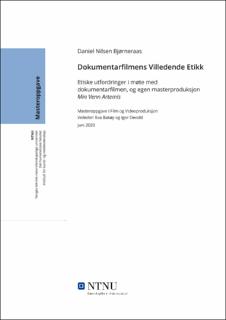| dc.contributor.advisor | Bakøy, Eva | |
| dc.contributor.advisor | Devold, Igor | |
| dc.contributor.author | Bjørneraas, Daniel Nilsen | |
| dc.date.accessioned | 2021-09-14T16:06:06Z | |
| dc.date.available | 2021-09-14T16:06:06Z | |
| dc.date.issued | 2020 | |
| dc.identifier | no.ntnu:inspera:53759382:34433389 | |
| dc.identifier.uri | https://hdl.handle.net/11250/2776592 | |
| dc.description.abstract | Denne avhandlingen setter søkelys på etiske problemstillinger som dokumentarister kan møte i produksjon av dokumentarfilm. Egen masterproduksjon og dokumentar Min Venn Artemis, brukes i studien for å avdekke etiske utfordringer vi selv støtte på. Et dybdeintervju med Håvard Bustnes, en dokumentarist med 21 års erfaring, brukes som ytterligere data relatert tematikken. Avhandlingen inneholder tematikk som dokumentaristens forhold til subjektene, og hvordan maktbalansen mellom de fungerer. Omfanget av egen deltakelse virker å være ukjent for subjektene, som gjør det nødvendig å vise varsomhet i arbeid med mennesker. Dokumentarens evne til å forme historier som er basert på virkeligheten, og hvorvidt det er etisk korrekt å mislede publikum, er noe oppgaven avklarer. Det viser seg å være innenfor etiske rammeverk å være kreativ med virkelighetens fremstilling, så lenge dokumentaristen opprettholder kontrakten med publikum i den forstand at de forstår hva som er ekte og ikke. Det er likevel vanskelig for filmskaperen å vite resultatet av filmen på forhånd, som gjør det enda viktigere å være åpen med subjektene i prosessen av å skape film om deres liv. Avhandlingen utforsker i hvilken grad filmskaperen må ta hensyn til representasjon av subjektene, i diskusjon rundt samfunnets krav på informasjon. Oppgaven utreder hvorvidt det er nødvendig å handle etisk korrekt, og om filmskaperen tjener på å gjøre dette. Det ble konkludert av Manuel Velasquez (1996) at det å handle etisk, gir bedre resultater, gitt at man menger seg med likesinnede etisk handlende individer (Velasquez, 1996, s. 208). | |
| dc.description.abstract | This master’s thesis highlights the ethical issues that documentaries may encounter in the production of documentary films. My own master production and documentary My Friend Artemis, is used in the study to uncover the ethical challenges we ourselves faced. An in-depth interview with Håvard Bustnes, a documentarist with 21 years of experience, is used as additional data related to the theme. The thesis contains themes such as the documentary's relationship with the subjects, and how the balance of power between them works. The extent of their own participation seems unknown to the subjects, which makes it necessary to exercise caution in working with real people. The documentary's ability to shape stories based on reality and whether it is ethically correct to mislead the audience is something the thesis clarifies. It turns out to be within the ethical framework to be creative with the representation of reality, as long as the documentary maintains the contract with the audience in the sense that they understand what is real and not. Still, it is difficult for the filmmaker to know the outcome of the film in advance, which makes it even more important to be open with the subjects in the process of making films about their lives. The thesis explores the extent to which the filmmaker must consider representation of the subjects, in discussion of society's demand for information. The thesis investigates whether it is necessary to act ethically correct, and whether the filmmaker gains in doing so. It was concluded by Manuel Velasquez (1996) that acting ethically produces better results, given that one mingles with like-minded ethically acting individuals (Velasquez, 1996, p. 208). | |
| dc.language | | |
| dc.publisher | NTNU | |
| dc.title | Dokumentarfilmens Villedende Etikk | |
| dc.type | Master thesis | |
